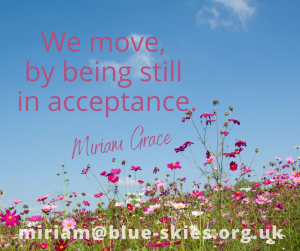CLICK ON THE PICTURE FOR MY NEW VIDEO:
“The Paradoxical Theory of Change”
..change occurs when one becomes what he is, not when he tries to become what he is not. Change does not take place through a coercive attempt by the individual or by another person to change him, but it does take place if one takes the time and effort to be what he is — to be fully invested in his current positions.
Arnold Beisser, M.D.
(click here for the original article)
The Paradoxical Theory of Change found in Beisser’s article is one of my favourite Gestalt concepts. I’m posting about this again, as I’m using this concept in my Nourish & Nurture Taster Week, beginning today. (Details of the Nourish & Nurture course beginning when the clocks go back can be found here.)
It struck me again today how the person centred values of empathy and being non-judgemental are not simply ways of creating a nice, fluffy therapeutic environment but that they are radical and political and turn the world on its head. They assume what the paradoxical theory of change assumes, that we do not need to change others or ourselves.
The Gestalt therapist rejects the role of “changer,” for his strategy is to encourage, even insist, that the patient be where and what he is. He believes change does not take place by “trying,” coercion, or persuasion, or by insight, interpretation, or any other such means. Rather, change can occur when the patient abandons, at least for the moment, what he would like to become and attempts to be what he is. The premise is that one must stand in one place in order to have firm footing to move and that it is difficult or impossible to move without that footing.
(Ibid)
So often we say, “I’m trying”: Trying to lose weight; to finish our essay; to relax; to stop crying; to get it right. Trying doesn’t work half as well as being.
Stopping trying is radical
Compassion, non-judgement and empathy for ourselves and others, support this radical step. Imogen http://www.imogenragone.net/blog/ said to me as I tried to relax my shoulders, that she often teaches her students, “if you are trying, you are not doing it”.
When we try to be who we are not, we stay more and more stuck in a cycle of attempting the impossible and of failure to become someone else’s version of us. When we are compassionate and accept ‘what is’, who we are, then profound change happens, ie. less effort can be more productive.
At a physical level this is what I experienced from my experience with Alexander Technique last week and psychologically, I know my brain function improves when my physiology is relaxed.
We may think, it’s all very well for Beisser to claim this but accepting our being is not so easy for us. We may well think this until we learn that the author was in an iron lung. A brilliant doctor who became ill, disabled and confined. His theory of being where we are cannot have been easily adopted.
Less effort can be more productive
Why do we feel we have to build a court case to simply be? Sometimes we seem to need to justify our expression of feelings, (“It’s because I’m tired / hormonal / I had a bad week”). I explain to my clients that when we sneeze, blink or hiccough we don’t go into long justifications, we know we are blinking because we need to blink, we don’t feel a need to explain. So is a weep or a shout or and excited jumping up and down really so unacceptable we have to apply for permission, quoting extenuating circumstances, before we can experience and express it?
What would it be like to just BE, to stop trying and and justifying and explaining?

So true, I love this theory too!
Thank you, Ellen. It’s compassionate mind therapy before CMT was invented!